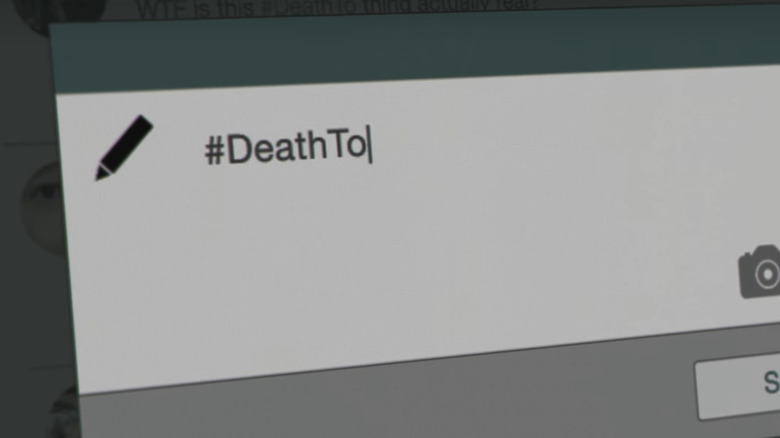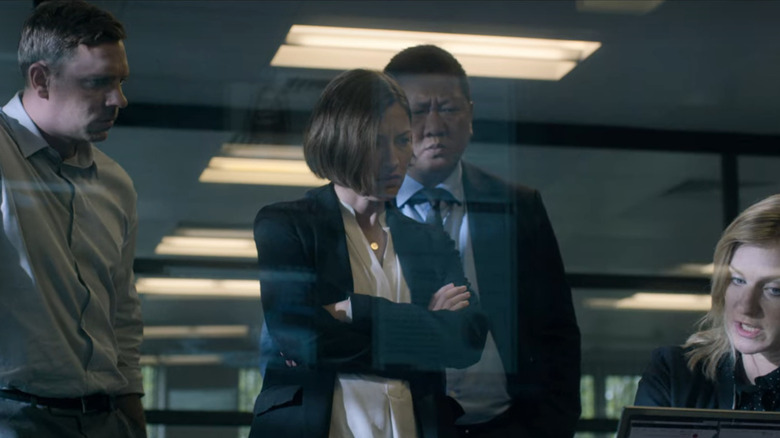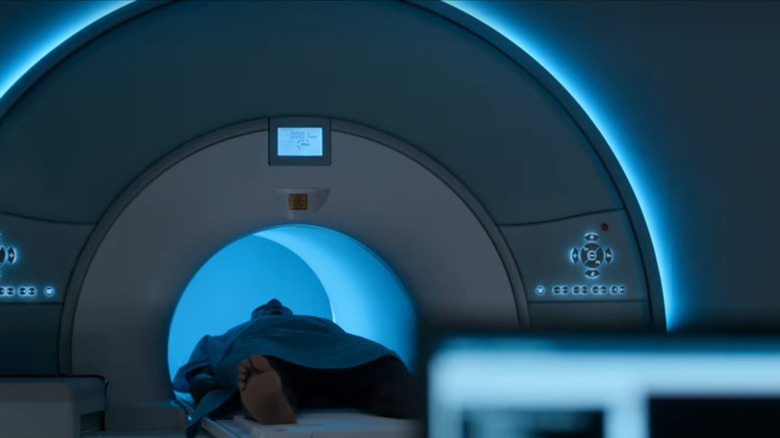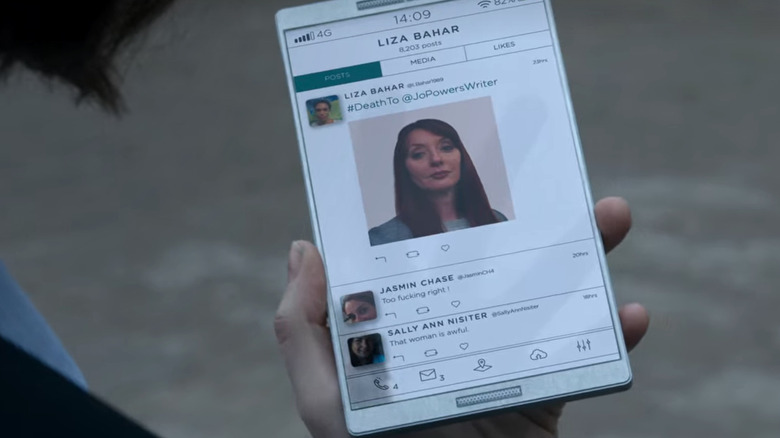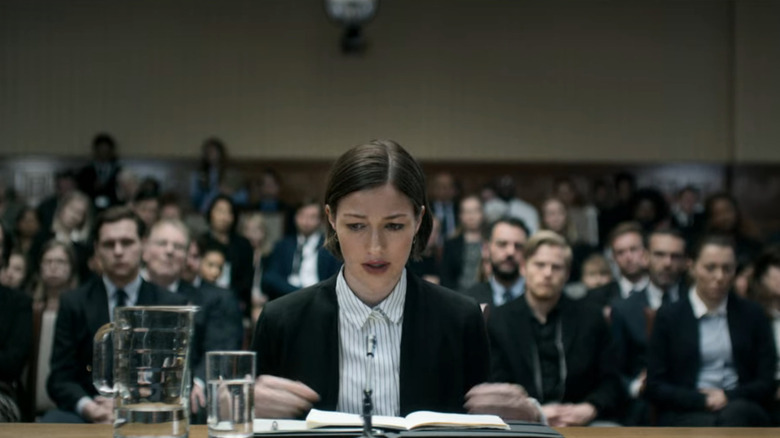'Hated In The Nation' Explained - Understanding Black Mirror's 'X-Files' Episode
The mob mentality is one of the most dangerous and chaotic aspects of human nature. It's also at the heart of one of the most troubling episodes of "Black Mirror." Season 3, Episode 6, "Hated in the Nation," presents the premise that technology has allowed some of humanity's worst impulses to run rampant on a nationwide scale. Once the genie is out of the bottle, it's almost impossible to put it back in.
"Hated in the Nation" centers around two basic technological ideas in practice. The first is that bees are going extinct and have been replaced with tiny automated drones called ADIs. These tiny robots are meant to go around pollinating flowers in place of the heavily diminished bee population. Meanwhile, the second is that through these insect-like drones, anyone anywhere could be killed, especially if someone were to gain control over them.
Of course, this being a "Black Mirror" installment that often feels like a disturbing "X-Files" episode, that's exactly what happens. However, the devious twist that series creator and writer Charlie Brooker put on this idea is that everyone decides who should die. This is where we get back to the notions of mob mentality and how much scarier this concept is on a national or even an international level, as amplified through the power of social media.
Mob justice rises to terrifying new heights
We've all heard about situations where a crowd is whipped into a frenzy. Sometimes it's by a charismatic person at a podium, and others, it's just a bunch of angry people crowded together and full of rage with nowhere to put it. Either way, though, the result is usually the same: people are either going to be badly hurt or killed.
What if this destructive energy could be channeled through technology, though? An unstoppable technology that can reach its victims anywhere and anytime? This is where the true terror of this "Black Mirror" episode comes in. As social media and the 24-hour news cycle expose us to new people to despise daily, it's easy to see how the technology available in "Hated in the Nation" could be a double-edged sword.
After all, it's already revealed over the course of the episode that drones are also being used to spy on the populace. However, it's this revelation that changes things up exponentially as far as the technology goes, as the ADIs in this "Black Mirror" episode can track people through their cellphones and via surveillance feeds.
Still, the grisliest aspect comes from the notion that the popular vote determines who should be the next victim of the drones. Furthermore, as if it were ever more relevant than it is now, the power to kill is channeled through a Twitter-like app where users can apply a hashtag and have their own say on who should die.
The moral dilemma at the heart of the episode
Though it might seem a bit unhinged, the idea of wishing death on people you barely know (or don't even know personally) is one that goes back surprisingly far. After all, countless political and economic systems throughout history have been designed or corrupted to the point where those at the bottom have so little that they naturally begin to garner a visceral hatred for those in charge who seemingly have everything.
However, what these theoretical subjects didn't have in the past and still don't have today is a way to take out that frustration on their target of choice. This is how "Black Mirror" changes things. While even the most frustrated among us are unlikely to plot an assassination attempt or try to start a civil war, we might be inclined to use a hashtag to vent some of our overflowing anger.
Like in "Hated in the Nation," while some might spurn the technology and opt-out from participating, there are plenty more who would embrace the ability to make direct and permanent changes to society without even leaving the comfort of their homes. Furthermore, there are others, teenagers and young adults in particular, who might just try it out for a lark, never really considering the consequences of their actions. However the tech is used, the question is really, as with any major technological innovation, who gets to decide and how can it be regulated?
Online outrage and the cycle of internet hate
If any military in the world had access to this kind of tech, they'd snap it up in a heartbeat. Still, if it's being fired off regularly by the whims of the populace, like in this "Black Mirror" episode, it just goes to show how quickly anyone could become a target. We see in "Hated in the Nation" how the fervor of public outrage can erupt seemingly out of nowhere and how the response is sometimes largely out of proportion to the actual act committed by the target.
For instance, we have far-right journalist Jo Powers (Elizabeth Berrington) mocking the suicidal sacrifice of a disability rights activist, a rapper named Tusk (Charles Babalola) who insults one of his fans, who is just a child, and Clara Meades (Holli Dempsey), a young woman who poses for an inappropriate photo at a war memorial. Now, it's easy to see why the public would disapprove of all three, but are they all the same? Is calculated menace really the same thing as just making a poor decision at the moment?
This seems to be the point of "Hated in the Nation," as technology like this could feasibly exist and has even been discussed by scientists to solve this very problem. However, as with any scientific or technological development, a power like this could easily be used for evil even if it has only been proposed to solve a desperate problem in the first place, like the lack of bees to pollinate our food.
How has Hated in the Nation predicted the future?
This, of course, brings us to today. Social media was originally imagined as a way for the user to reconnect with old friends or co-workers, meet new friends and lovers, or get their ideas out to a wider audience. In some ways, the idea of this kind of technology borders on the utopian when you think of it like that. However, this has been pretty far from the end result.
What we have in much of the world today is a reflection right out of the "Black Mirror." Isolated groups with increasingly disparate and divisive beliefs argue with each other relentlessly or simply disappear into their own echo chambers of like-minded individuals. However, when a majorly divisive personality emerges into the public sphere, they could easily become a target for this kind of attack.
Take polarizing politicians, notorious public figures, or even celebrities who have been caught up in a scandal at one time or another. Any of these types of people could regularly and easily become a real-life target for this kind of technology if it actually existed.
This is not to suggest that aren't plenty of people in these categories who have said or done bad things. Only that the notion that they should be killed for these actions is a very extreme response and one most people would not want to see happen. Unless, perhaps, they could do so safely without the threat of arrest or consequences.
Why did Hated in the Nation end that way?
Finally, this takes us to the end of the episode. The final revelation comes when there is an attempt to disable the drone system, and it goes horribly wrong in proper "Black Mirror" fashion. Instead of shutting down, the ADIs react by killing everyone who has used the hashtag to wish death on another.
The public hearing that Detective Chief Inspector Karin Parke (Kelly Macdonald) is at is in response to this shocking national tragedy. Still, despite knowing that Garrett Scholes (Duncan Pow) was responsible for the corruption of the ADIs, the villain escapes largely unpunished to simply start again somewhere else. Or does he?
"Hated in the Nation" caps things off with an open-ended conclusion that sees Parke's protege, Blue Coulson (Faye Marsay), tracking down Scholes in a foreign country. However, it ends before showing what happens next, and there is no continuation of the story in the remainder of the "Black Mirror" episodes that have come since.
Still, what the ending suggests is that Coulson might choose to take vigilante justice on Scholes herself. Not only that, but Parke immediately deletes the text after she gets it, suggesting that she may not only support such an action but might even be happy to help cover up evidence of her own in her phone. The message seems to be that, once again, those in charge are happy to color outside the lines regarding these types of technology, but only if they can also maintain control over them.

